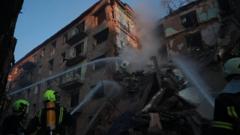Israeli airstrikes on Iranian military and prison facilities continue as accusations of escalating aggression are exchanged, while international leaders urge for de-escalation and negotiation.
**Escalating Tensions: Israel's Continued Strikes on Iran Amid Diplomatic Efforts**

**Escalating Tensions: Israel's Continued Strikes on Iran Amid Diplomatic Efforts**
Intensifying military actions have erupted between Israel and Iran, with Israel targeting key sites in Tehran as diplomatic channels remain strained.
June 23, 2025, 7:39 a.m. ET – Recent developments in the ongoing conflict between Israel and Iran have escalated dramatically, as Israeli forces launched extensive strikes on Tehran. According to Israeli military sources, the targeted facilities included a paramilitary headquarters, a notorious prison, and key access routes to the Fordo nuclear site. This escalation coincided with a meeting between Iranian Foreign Minister Abbas Araghchi and Russian President Vladimir Putin, raising concerns about further regional instability.
Since the U.S. entered the fray with strikes on three Iranian nuclear sites, tensions have soared, prompting Iran to respond with missile fire towards Israel. This has compelled many residents in regions like Haifa and central Israel to seek shelter, highlighting the growing impact of cross-border hostilities. Reports suggest significant damage in Tehran as world leaders call for calm, while fears of broader conflict loom.
As the aftermath of the initial U.S. strikes continues to unfold, details remain murky regarding the actual state of Iran’s nuclear program. Despite President Trump's assertions of significant damage to Iranian capabilities, military officials admit they lack precise information on Iran's near-bomb-grade uranium stockpile.
In response to ongoing hostilities, global diplomats have gathered to discuss potential peace efforts. Kaja Kallas, chief diplomat of the European Union, emphasized the critical need for negotiation to prevent further escalation, stating the dangers of retaliation. Likewise, the International Atomic Energy Agency has issued warnings of potential catastrophic consequences if military actions persist.
Iran's leadership is reportedly considering their options for a retaliatory response, particularly as signals indicate that Iran-backed militias may prepare to target U.S. military bases in the region. With various military assets still positioned in the area, the heightened tension raises concerns over potential attacks.
In conclusion, the conflict remains precarious with diplomatic efforts becoming increasingly crucial amid military operations. As both sides navigate this volatile landscape, the potential for a broader regional confrontation persists, with many eyes watching for developments that could either change the course of this ongoing struggle or lead to renewed violence.
Since the U.S. entered the fray with strikes on three Iranian nuclear sites, tensions have soared, prompting Iran to respond with missile fire towards Israel. This has compelled many residents in regions like Haifa and central Israel to seek shelter, highlighting the growing impact of cross-border hostilities. Reports suggest significant damage in Tehran as world leaders call for calm, while fears of broader conflict loom.
As the aftermath of the initial U.S. strikes continues to unfold, details remain murky regarding the actual state of Iran’s nuclear program. Despite President Trump's assertions of significant damage to Iranian capabilities, military officials admit they lack precise information on Iran's near-bomb-grade uranium stockpile.
In response to ongoing hostilities, global diplomats have gathered to discuss potential peace efforts. Kaja Kallas, chief diplomat of the European Union, emphasized the critical need for negotiation to prevent further escalation, stating the dangers of retaliation. Likewise, the International Atomic Energy Agency has issued warnings of potential catastrophic consequences if military actions persist.
Iran's leadership is reportedly considering their options for a retaliatory response, particularly as signals indicate that Iran-backed militias may prepare to target U.S. military bases in the region. With various military assets still positioned in the area, the heightened tension raises concerns over potential attacks.
In conclusion, the conflict remains precarious with diplomatic efforts becoming increasingly crucial amid military operations. As both sides navigate this volatile landscape, the potential for a broader regional confrontation persists, with many eyes watching for developments that could either change the course of this ongoing struggle or lead to renewed violence.























